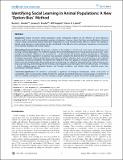Identifying social learning in animal populations : A new ‘option-bias’ method
Abstract
Studies of natural animal populations reveal widespread evidence for the diffusion of novel behaviour patterns, and for intra- and inter-population variation in behaviour. However, claims that these are manifestations of animal ‘culture’ remain controversial because alternative explanations to social learning remain difficult to refute. This inability to identify social learning in social settings has also contributed to the failure to test evolutionary hypotheses concerning the social learning strategies that animals deploy. We present a solution to this problem, in the form of a new means of identifying social learning in animal populations. The method is based on the assumption that social learning will generate greater homogeneity in behaviour between animals than expected in its absence. Our procedure compares the observed level of homogeneity to a bootstrapped sampling distribution utilizing randomization and other procedures. We illustrate the method on data from groups of monkeys provided with novel two-option extractive foraging tasks, demonstrating that social learning can indeed be distinguished from unlearned processes and asocial learning, and revealing that the monkeys only employed social learning for the more difficult tasks. The method is further validated against published datasets and through simulation, and exhibits higher statistical power than conventional inferential statistics.
Citation
Kendal , R L , Kendal , J R , Hoppitt , W J E & Laland , K N 2009 , ' Identifying social learning in animal populations : A new ‘option-bias’ method ' , PLoS One , vol. 4 , no. 8 , e6541 . https://doi.org/10.1371/journal.pone.0006541
Publication
PLoS One
Status
Peer reviewed
ISSN
1932-6203Type
Journal article
Collections
Items in the St Andrews Research Repository are protected by copyright, with all rights reserved, unless otherwise indicated.

